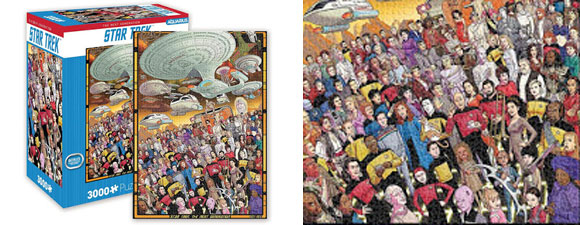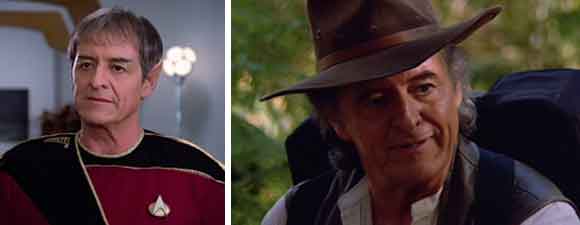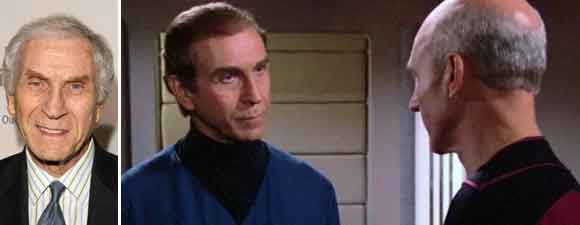Retro Review: The Outcast
7 min readA joint mission between the Enterprise and an androgynous race is complicated when one of the androgynes falls in love with Riker, bringing out forbidden “female” feelings.
Plot Summary: The Enterprise searches for a missing shuttlecraft belonging to the J’naii, a race of androgynes. When a Starfleet probe disappears as well, LaForge and Riker theorize that the shuttle may have disappeared into a pocket of null space that absorbs electromagnetic energy. Riker becomes friendly with a J’naii named Soren, his co-pilot on the rescue mission, who is very curious about the dual genders and mating habits of humans. Soren tells Riker that among the J’naii, a preference to be male or female is considered perverted. Later Soren confesses to an attraction to Riker, explaining that on her planet, those who gravitate toward a gender are often abused, then subjected to treatments that alter their behavior and personalities. Soren says that it is necessary for those with such inclinations to live a life of lies and find each other in secret. After successfully rescuing the two J’naii stranded in the shuttle trapped in null space, Soren and Riker find each other at the celebration on the planet’s surface. The two walk off into the woods together and become intimate. But when Riker tries to find Soren later on the Enterprise, he learns that they were seen sneaking away and that Soren has been arrested. Interrupting the judicial proceedings, Riker claims that their relationship was entirely his fault, a result of his failure to understand J’naii culture. Soren interrupts him to say that this is not true and that all the others on the planet who feel male or female are tired of living lies and being persecuted. The judge orders that Soren receive treatment. Picard tells Riker that he cannot interfere in J’naii internal affairs, but Riker attempts a rescue anyway. When he finds Soren, the “treatment” has already been administered, and Soren now believes that both any J’naii gender orientation and their relationship are wrong. Riker professes his love, yet must accept being rejected and tell Picard that it is time to depart.
Analysis: It saddens me to say that “The Outcast” doesn’t seem nearly as dated as it should. Most episodes that end with big speeches about social problems make me feel compelled to note that it’s a bit pedantic, often even boring, to present issues in that manner – who likes to be lectured by TV characters? In this case of this, though, Soren’s concluding speech seems just as relevant now as it did when the episode aired. It’s heartbreaking, because we live in a culture where prominent political and religious leaders still believe people can and should be “cured” of their sexual orientations, and where even though the U.S. Congress voted this very week to expand hate crime legislation to cover gays and lesbians, people are still persecuted daily for who they love and how they define their identities.
There’s little point in pretending “The Outcast” is about anything other than the politics of human sexuality, even though the story is told using the J’naii to give viewers some distance. In some ways it’s not as daring as Ursula LeGuin’s masterpiece The Left Hand of Darkness, which seems an obvious antecedent – a human male develops a friendship with an androgyne who becomes female during a mating cycle – but in some ways it goes further, since Riker reciprocates both the emotional and sexual attraction that Soren feels for him. Jonathan Frakes reportedly lobbied to have a man cast as Soren and commented more than once to interviewers that he didn’t think the episode went far enough – since all the J’naii are played by female actors in bland robes with boyish haircuts, the society seems more sexless than androgynous, with Soren’s obvious difference being passion rather than an alternative sexuality, whereas the sight of Riker kissing someone who looked male would have been a much more direct challenge to viewers who hold to a one-man/one-woman view of sexual or romantic love. I agree with Frakes, but at the same time, I understand why the producers chickened out. If homophobic viewers had turned off the episode during the kiss, they’d have missed Soren’s speech, which is more important.
In fact, I think it’s important enough that I’m going to quote the whole thing:
I am female. I was born this way. I have had those feelings – those longings – all of my life. It is not unnatural. I am not sick because I feel this way. I do not need to be helped; I do not need to be cured. What I need, and what all of those who are like me need, is your understanding and your compassion. We have not injured you in any way, and yet we are scorned and attacked, all because we are different. What we do is no different from what you do. We talk and laugh, we complain about work, and we wonder about growing old. We worry about our families and we talk about the future. And we cry with each other when things seem hopeless. All of the loving things that you do with each other…that is what we do. And for that we are called misfits and deviants and criminals. What right do you have to punish us? What right do you have to change us? What makes you think you can dictate how people love each other?
Obviously, not all biases are as strong as the J’naii prejudice against gender. Worf is uncomfortable around the androgynes, though he can’t articulate why; he just knows that the idea of a human and a J’naii together repulses him. He also thinks that poker with wild cards is a woman’s game, though he can’t explain that declaration without calling both the game and women weak, an attitude that Crusher had just told Soren no longer existed among humans in Starfleet. Crusher is stymied when Soren asks what it’s like to be female – she has no good explanation for why women wear their hair longer and put on makeup (thus showing that the series writers themselves aren’t free from Western bias, since there are places on Earth where both long hair and cosmetic adornments are associated more with men than women). It doesn’t occur to Crusher, who has given birth, to talk about her sex in terms of that significant biological difference between males and females. Riker doesn’t do much better trying to explain gender differences (“sugar and spice and everything nice”), nor discussing what attracts a particular male to a particular female. He cites intelligence and a sense of humor as his own top two turn-ons, but even he seems surprised by the depth of his feeling for someone whose culture, sexuality – and presumably some anatomy – are so far outside his previous experiences.
Even though I think it’s important that he declares his love to Soren, I’m not sure I fully believe it. Riker knows Soren’s most intimate secrets, but the reverse is not true; Riker talks to Troi about Soren, yet he doesn’t tell Soren about his Imzadi, and we see none of the expected discussions of family, faith, hopes for the future – the sharing of ideas and beliefs that shifts fleeting passion into lasting intimacy. Even so, the stakes for Riker are very high – so high that he is prepared to defy Starfleet if necessary when Picard reminds him that the Prime Directive forbids the first officer of the Enterprise from interfering in J’naii custom. I’m sure part of Riker’s devotion stems from attachment to Soren, but I think he does blame himself for being the one with whom Soren was discovered, as he tells the judge, and I’m also not sure that Riker would have to have a personal relationship with someone who faced the erasure of an important aspect of identity for Riker to feel compelled to interfere. The loss for him is both very personal and also psychologically, socially, and politically abhorrent to him.
It makes me so happy that Worf, who makes faces at the idea of a human with a J’naii, insists on accompanying his friend to the planet to try to rescue Soren. Worf recently tried to involve Riker in a Klingon custom that Riker found repulsive – and wow, Worf made a full recovery from paralysis quickly – so it’s nice to see that Worf will remain loyal to that same human whose inclinations may initially disgust him. And given the impending Worf-Troi-Riker love triangle, it’s delightful how much all three of these people care about each other and respect one another’s feelings. The scene where Riker tells Troi with some embarrassment that he’s met someone else, ending with a sweet, affectionate kiss, is heartwarming, particularly now with the post-movie knowledge that they’ll eventually find their way back to one another and marry. As Troi says, relationships are constantly changing, but a strong friendship will only become stronger. It’s another aspect of the idea that love is love, whether it’s romantic or platonic, between people of the same sex or different sexes, regardless of species, birthplace, culture, and all the rest.
The idea that Kirk kissing Uhura once posed such a dilemma for television censors that the characters’ lips couldn’t meet now seems archaic, absurd. I’m hoping that at some point in the future when I watch “The Outcast,” it will seem similarly antiquated.






